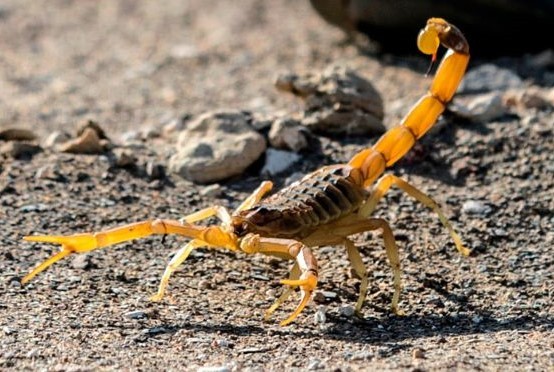
Central Texas is experiencing a scourge of scorpions.
The arachnids, featuring two fearsome-looking pincers and a stinger at the end of a curved tail, have been crawling into people's homes looking for ways to beat the heat in the state.
"What's happening now is it's getting so hot outside, getting dry, they're seeking a cooler place to go," Alan Brown, a board certified entomologist with ABC Home and Commercial Services, told KXAN in Austin.
He said the pest control business is seeing a hike in calls about the eight-legged creatures.
Dave Moellendorf with Zookeeper Exotic Pets told the station that the wet spring season is also causing increased sightings.
"When we've had the storms, they've been like real drenchers that bring them up to the surface," he said.
Nineteen species of scorpions can be found in the Lone Star State but two of them - the cave scorpion and the striped bark scorpion - are the most numerous in Central Texas and are the ones most likely to creep into a home.
Dry, hot weather compels scorpions to search out cool environments.
"During the day they hang out under rocks or try to stay somewhere that's nice and cool," Brown told the station.
"They can't tell the difference between a rock and a house, which is why they come indoors. They're just like us, wanting to enjoy the warm weather but only so much," he said.
To keep them outside the home, Brown recommends sealing cracks, replacing weather stripping and caulking any holes in the home's walls.
Pest control solutions also work to kill the scorpions and the insects they feed on, but Brown also said common pesticides aren't always effective and special treatments may be needed.
He also tells homeowners to trim branches, saying "these guys are good climbers."
If you fear stepping on one, Moellendorf said using a black light will help you spot them.
"When you get up during the night to go to the bathroom, or to go to the kitchen or whatever you're doing in the dark, they will glow. They fluoresce. They will fluoresce a very brilliant green color. And so you can see them in the dark," Moellendorf said.
He said the venom in their stingers isn't typically fatal but noted that people and pets could have a serious allergic reaction to it.
"If you start having trouble breathing or swallowing, or you start having tingling on the tongue, or numbness in the face, time to go get checked out by the doctor and be safe," Moellendorf told the station.
© 2025 HNGN, All rights reserved. Do not reproduce without permission.









